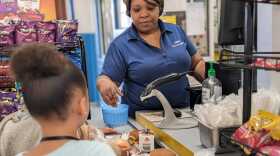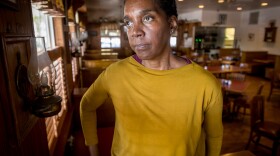When you walk into the Southeast Raleigh Black Farmers Market on Sundays, you are immediately met with the sound of old-school R&B and soulful gospel music. There’s a distinct smell of jerk chicken and frying fish from the Black-owned food trucks. Grandmothers wear church hats and carry baskets full of fresh produce. Others wear braids and head scarves.

Vegan-based Chef Amelia Irene Steed sits in the far right corner of the market; her table is full of her homemade spices and recipes. She joined the Black Farmers Market last year with the intention of building Black social and economic wealth.
The market runs on bi-monthly Sundays in Durham and Raleigh to provide fresh food options in communities with limited access to garden-fresh produce. According to federal data, only 3% of farms in the state are owned by Black farmers.
“The bad taste of slavery for the African American community often has shunned farming as an industry for us,” says Steed. “I believe that one of the greatest things about the Black Farmers Market is shifting that narrative.”
Steed is the creator of Lotus Lane Culinary, a catering company that helps people on their own wellness journey through cooking classes that encourage community health.
“I mean, the fact that we can grow our own food and create a legacy for future generations to help them eat better, live better, be better, is one of the greatest things that I have walked away from as being part of the Black Farmers Market,” says Steed.
Steed grew up around food. She’s named after both her grandmothers, but she only met one. Grandma Irene died in her 40s from breast cancer, while Grandma Amelia died in her 60s from diabetes and heart disease. These health disparities in the Black community aren’t new.
A recent report from the CDC shows that 80% of Black women are overweight or obese, considerably more than non-Hispanic white women.
Steed’s motivation for being a vegan chef comes from both of her grandmothers. She sees a correlation between generations-old recipes and these health issues.

“A lot of what comes from soul food is really the emotional connection. It connects us to our ancestors. And when we're sitting at that table, it's 'Oh my god, you made that just like grandma's mac and cheese,'” Steed says. “The connection is okay, but what is this doing to my body? One of my goals is to shift that emotional connection a little bit and still maintain that ancestral connection. Grandma would want me to have my best life. So maybe we can shift this recipe a little bit so I can live longer.”
Steed explains how changing seasonings and cooking practices is only the beginning of this journey. She believes that if we don’t find a solution for Black and Brown communities, her work won’t matter.
“In my opinion, we fight that back with food, in our ability to unify around the food, whether it's from the grower to the producer, to the chef, you know, it truly takes a village to fight it,” says Steed.
For vendors like Steed, food accessibility is not the only bridge to creating social and economic growth in Raleigh-Durham communities, it's about using our food as fuel to sustain our lives, and building a village to support that mission.








